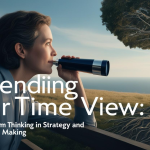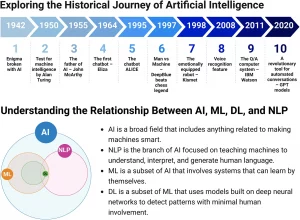We live in a time of radical transformation, an era in which artificial intelligence is rewriting the rules of the game in almost every industry. In this dynamic and continually evolving context, a crucial distinction emerges forcefully, a paradigm shift in the way of conceiving leadership and management: the progressive affirmation of leadership compared to the traditional management model. This is not a simple replacement, but a necessary evolution to face complex challenges and exploit the unprecedented opportunities that the future presents us.
To fully understand this transition, it is critical to analyze the foundations of management, an approach that has dominated the business landscape for much of the last century. Iconic figures such as Frederick Taylor, with his obsession with efficiency measured by the clock, Ray Kroc, architect of standardization in the world of fast food restaurants, and Henry Ford, pioneer of the assembly line, embodied a model based on repetitive processes, precise measurement and executive uniformity. The very expression of “human resources” reflected a vision in which people were perceived as cogs in a well-oiled machine, performers of predefined tasks. This approach has proven extraordinarily effective in contexts characterized by repetitive and standardized activities, where predictability and control were key elements for success. Think, for example, of the flawless operation of a fast food restaurant or a production line.
However, the world is changing rapidly. The advent of artificial intelligence is progressively automating precisely those repetitive and codifiable activities that constituted the fulcrum of traditional management. In this scenario, the added value of people no longer lies in the mere execution of predetermined tasks, but in their ability to think critically, innovate and find creative solutions to complex problems. This is where leadership comes in.
Leadership is not based on dictating every single step, giving orders and fine-grained control. On the contrary, authentic leadership is based on the ability to build a community, a fertile environment in which motivated people, equipped with the right resources and focused on clear strategic objectives, feel empowered and inspired to find solutions independently. A true leader does not presume to know all the answers, but is committed to creating the conditions for collective intelligence to emerge and thrive.
An illuminating example of leadership in action comes from the story of Google’s early years. Faced with a critical search engine slowness problem that threatened the company’s very survival, two engineers, acting on their own initiative, found a revolutionary solution by “hacking” Dell hard drive controllers. This brilliant intuition, born from their competence and freedom to experiment, allowed them to overcome a seemingly insurmountable obstacle. It is unthinkable that Google founders Sergey Brin and Larry Page could have given such a specific order. Their leadership manifested itself in creating an environment in which talented engineers felt compelled to solve critical problems, with the appropriate resources and recognition for their contributions.
Another area in which leadership principles find particularly effective application is that of hospitality. A luxury hotel that gives its front-line employees, such as those who clean rooms, a significant budget to use independently to solve the problems of dissatisfied customers perfectly embodies this philosophy. Instead of rigid protocols and long approval chains, it relies on staff judgment and initiative to ensure a positive guest experience. This tactical autonomy, while maintaining a clear business strategy focused on service excellence, demonstrates how trust and delegation can generate amazing results.
The book “Reasonable Hospitality” by Will Guidara explores this concept further, emphasizing that true hospitality is based on authentic service and mutual trust, and not on attempts at manipulation. It’s about creating a memorable experience for the other, going beyond expectations and demonstrating sincere attention to their needs.
An emblematic anecdote taken from the world of high-end catering perfectly illustrates this principle. In a starred restaurant, a waiter, during service, listens to a conversation between a couple who are celebrating a wedding anniversary. His wife fondly remembers their first date in New York, during which they shared a simple hot dog purchased from a kiosk in a nearby park. Without hesitation, the waiter works to retrieve an authentic New York hot dog and presents it to the couple as a special entree, unexpectedly recreating that precious memory. This gesture of true hospitality, born from the employee’s sensitivity and freedom of action, creates a profound emotion and transforms a simple meal into an unforgettable experience, generating positive word of mouth that is far more effective than any conventional marketing strategy.
The transition from management to leadership does not mean the disappearance of the need for organization and processes. Rather, it implies a change of focus: from rigid control to enabling people, from impersonal standardization to the valorization of individuality and creativity. In an era dominated by artificial intelligence, the true competitive resource of companies lies in human capital, in its capacity for strategic thinking, innovative problem solving and emotional connection with customers.
Defining a clear strategy therefore becomes even more crucial. Leadership has the task of charting the course, communicating a shared vision and defining the objectives to be achieved. But, once the “what” has been established, it is essential to leave teams the freedom to define the “how”, to find the most effective tactics to achieve those results. This approach not only stimulates innovation and agility, but also increases the sense of responsibility and engagement of employees, who feel they are an active part of the process and not simply executors of orders.
In conclusion, the advent of artificial intelligence is not a threat, but an opportunity to redefine how we work and lead our organizations. The traditional management model, despite having played a fundamental role in the past, is giving way to an era in which enlightened leadership, based on trust, autonomy and the ability to inspire and motivate people, becomes the true engine of success. It’s time to embrace this new era, to cultivate leaders capable of building resilient and innovative communities, capable of transforming challenges into opportunities and creating memorable experiences for all those who come into contact with our reality. The future belongs to those who know how to lead with their heart and mind, unleashing people’s extraordinary potential.









